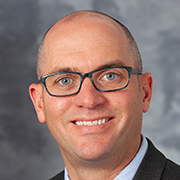 Lucas T Schulz, PharmD, BCIDP ([email protected]) is manager of infectious diseases, solid organ transplant, and experiential education and the PGY1 and PGY2-infectious diseases residency program director at University of Wisconsin Health. Schulz is also associate clinical professor at the UW-School of Pharmacy, contributing clinical rotations and clinical lectures in pharmacotherapy. Previously, he practiced as a critical care pharmacist in medical, surgical, and neurosurgical intensive care units at the University of Wisconsin Hospitals and Clinics. Schulz received his PharmD degree from the University of Wisconsin School of Pharmacy. He completed a PGY1 residency and PGY2 critical care residency at the University of Wisconsin Hospital and Clinics. He is the author of 90 peer-reviewed publications and over 100 abstracts. In his current role, he is responsible for pharmacy practice advancement and is recognized as an innovative leader of pharmacists and pharmacy practice.
Lucas T Schulz, PharmD, BCIDP ([email protected]) is manager of infectious diseases, solid organ transplant, and experiential education and the PGY1 and PGY2-infectious diseases residency program director at University of Wisconsin Health. Schulz is also associate clinical professor at the UW-School of Pharmacy, contributing clinical rotations and clinical lectures in pharmacotherapy. Previously, he practiced as a critical care pharmacist in medical, surgical, and neurosurgical intensive care units at the University of Wisconsin Hospitals and Clinics. Schulz received his PharmD degree from the University of Wisconsin School of Pharmacy. He completed a PGY1 residency and PGY2 critical care residency at the University of Wisconsin Hospital and Clinics. He is the author of 90 peer-reviewed publications and over 100 abstracts. In his current role, he is responsible for pharmacy practice advancement and is recognized as an innovative leader of pharmacists and pharmacy practice.
Lucas has been an active member of ASHP since 2003. He currently serves as the director-At-large for the Section of Inpatient Care Practitioners. Previous service to ASHP includes delegate to the ASHP House of Delegates, member of the ASHP New Practitioners Forum, and moderator and presenter at multiple ASHP Midyear Clinical and Summer meetings. Lucas supports the development of ASHP Board Certification in Infectious Diseases as author and reviewer. He is the residency program director of two ASHP-accredited programs since 2012. Lucas is also involved in leadership roles nationally and within the state of Wisconsin.
The practice of medicine evolves rapidly and is opening opportunities for pharmacists to improve patient care. Inpatient pharmacists are ready to meet those opportunities with the support of this ASHP section. Section members are stepping into roles which leverage our drug expertise, including medication safety and medication management; sharing best practices; and educating the future generation of pharmacists and technicians.
Inpatient care pharmacists identify medication safety issues and medication use optimization opportunities and translate patient-level problems into system-level solutions. I look forward to growing the section’s sharing of best practices, including implementation strategies, amongst all members but especially with small and rural hospitals. Supporting inpatient pharmacist roles is critical to the advancement of the pharmacy profession, local pharmacy department, and, most importantly, patient success.
It is not enough to simply solve problems and share success. Technicians, students, and residents support and learn about the inpatient pharmacists’ expansive and important roles improving the medication use process. We must further engage technicians and students to support our mission to improve patient outcomes through safe and effective medication management. Declining pharmacy student enrollment and, thus, a decreasing pipeline of future pharmacists needs to be reversed if our profession wants to continue to take accountability for the medication use process.
I am honored to be nominated as chair for this section. I look forward to achieving the goals outlined in the section’s strategic plan – pharmacy practice advancement, best practice sharing, and education – and serving as your advocate. I welcome the opportunity to serve you!
